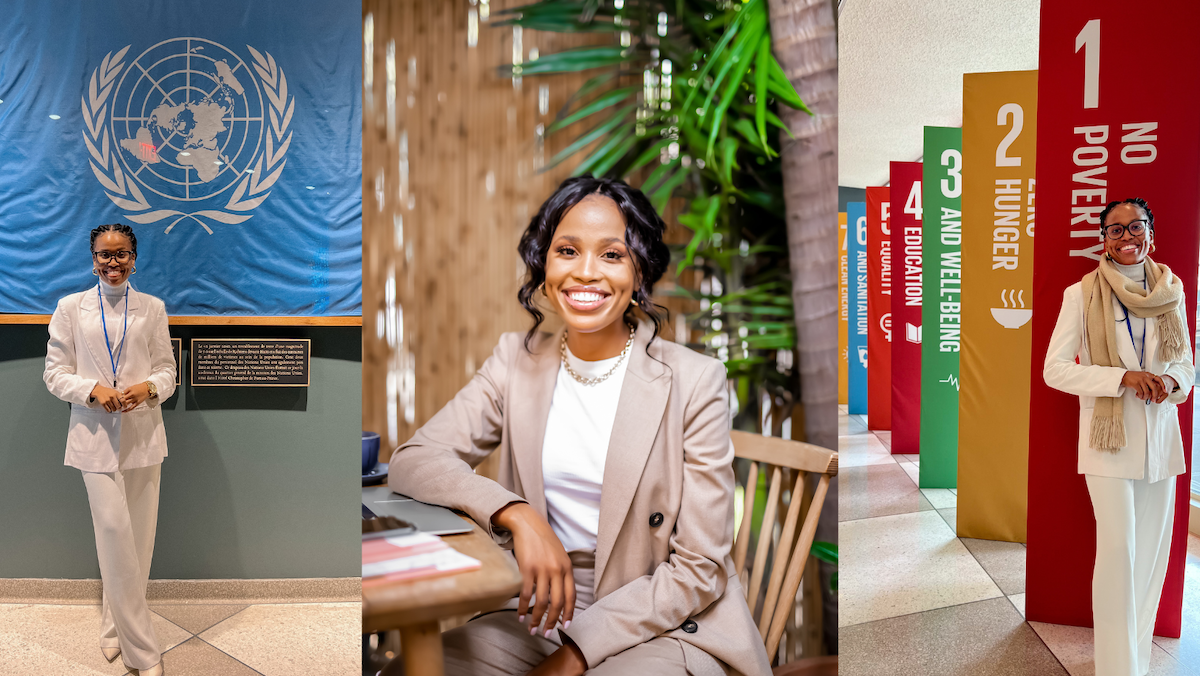Take Five: Intergenerational problem solving is critical to achieving gender equality
Date:
Phemelo Segoe, 29, a marketing manager of a company that provides free online learning support to school learners, participated in CSW67 as one of the youth delegates from South Africa. Participating in this year’s CSW67 deliberations strengthened her resolve to empower and support young women and girls to pursue STEM education and careers.

How did you come to attend CSW-67?
I was selected at the South African CSW civil society consultation, hosted by UN Women South Africa Multi-Country Office and Ilitha Labantu (an NPO that champions the rights of women and girls in South Africa) in February. Ilitha Labantu is one of UN Women’s civil society partners in South Africa. This was after I gave a presentation on the work we do at Tuta-Me, as part of a presentation for a panel discussion on the gender gap in the digital access to skills and education.
What were your highlights from this year’s CSW?
Firstly, being there in-person was a big deal for me. To be in the same room, engaging with and connecting with incredible changemakers from around the globe working towards gender equality was incredibly inspiring. I also enjoyed participating in numerous side events that was both educating and enlightening on very specific issues that touch on the inclusion of women in innovation and technology. Secondly, I loved connecting with other young people, like myself, from around the continent and the rest of the world. I realized that though our issues may have unique elements depending on our local context, we have much more in common. For example, in one of my conversations with a representative West Africa I realized how much young women from rural South Africa and rural Nigeria have similar challenges around technology – lack of devices, connectivity issues, power cuts, the cost of data for young and unemployed women, etc.
What was your biggest takeout from the sessions and how will it impact the work you do?
More than anything, I left inspired and energised. In one of the talks, it was mentioned that by 2030, 75 per cent of the jobs will be STEM-related and that made me quite concerned about the progress my own country, South Africa, is making in this area. Not only are we not excelling in mathematics, but we don’t have enough girls pursuing STEM subjects in high school. The exposure, inclusion, and channelling of girls into the STEM field are urgent and though there is a lot of talk about it we need more action. After this CSW it is clear to me that I need to see what I can sink my teeth into, whether that is by trying to pivot with the partners that I work with or identifying new organizations to include in my scope that focus heavily on these areas. My big homework is to identify key players already working in this space, find the gaps, and see how we can fill them.
Why is the youth voice important in platforms such as CSW?
The intergenerational approach to problem-solving that has been employed in this CSW session is critical. On the one hand, we, the youth, are the ones that will live in the world the older generation is talking about. When we are not there, we don’t know what conversations are being had and we don’t understand the kinds of solutions being agreed to. If you don’t have the youth voice in these spaces, you lack the young perspective and risk solving the wrong problems or solving valid problems the wrong way. If decision-makers are not in touch with young people, our lived realities, and perspectives they may make decisions without us that we have to live with. We need to be part of these conversations and part of the change. On the other hand, my generation has a lot to learn from the older generation who have made progress on some of the most pressing issues around gender equality. The older generation has a lot of insight they can share with us and to completely discard the existing knowledge and historical context is unwise, we should be building on that. Women’s challenges have not changed through the generations, they are just packaged differently. Fundamentally we are still fighting against exclusion, marginalization, and, victimization.
What are your hopes for the future of CSW?
Every organization and government should have the mandate to bring a young person or young people with them each year to CSW. Imagine what this kind of inspiration, exposure, and connection would do for other young women like me and what that could translate into in their home countries. It broadens your understanding and transforms the way you think about the work you are doing in your own little space to improve the lives of women and girls in your part of the world. If we’re going to be solving problems, we need to do it together. If you want me to dream big, show me big and that’s what this opportunity has done for me. I also hope that the deliberations we had will be followed by strong commitments and measurable actions with impactful results. We’ve spoken about challenges, and recommendations have been made but they now need to be implemented. We are interested in the follow-through and resources to match the recommendations.